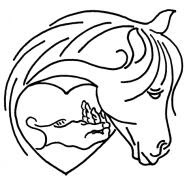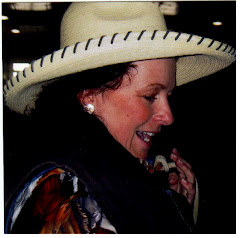
After a long weekend of lessons in Omaha and Lincoln, frustrating cancellations (as usual) and driving over 600 miles I was exhausted last night when I got home around 10:00pm. Went straight to bed after hearing about the deer hunting weekend.
The joy is the absolutely wonderful day I had with my horses. I played with eight of
them. I started with Sunshine, and I wept tears of joy in her mane as if I had met up with a lost loved one after months of not seeing her. Well, I do see her and feed her everyday, but have not spent any quality time with her since July, or maybe before that. I can't even remember the last time, because I have been too busy training other people's horses. Sunshine was perfect, she was so soft and responsive and we did everything at liberty because I soon realized I didn't need a halter. She was so with me I can't even explain it.
It also makes me sad when I go to work with other people's horses that are so disconnected from them or even in opposition to the people. I am not trying to put anyone down, so please don't take it that way if I gave you a lesson this weekend or have ever given you a lesson.
But after working with eight of my horses today: they were all so with me,I was on phase one and only once in a great while two, much of the time I was just thinking it and they were doing it, I realize how many horses are using huge defense strategies to just survive. I worked with a horse this weekend that was so shut down, introverted and catatonic that I have never seen the like. He is only three and just shut his eyes like a child hoping that if he didn't look at you, you might go away. Then another was in total flight mode in fear. These were suppose to be broke horses. Another was so crabby and cinchy.
It is so heartbreaking that people think they have trained these horses, but in my eyes, mind, and heart they are far from being trained and even further from being a partner. The people who own these horses just bought them a couple two or three weeks ago, so the sad shape these horses are in is not their fault. However, it just puzzles me that a person would sell these horses as well broke. I guess people are just so accustomed to brace and resistance in horses that it is just looked at as normal, they don't even know what true oneness feels like.
So coming home to work with my horses for the first time in months was such a joy today to find out that they are so different from most of the horses that I encounter when I am on the road. Now, not all of them, so please don't get offended if I saw you and your horse this weekend. Some of you have a very good relationship with your horse and are making super progress each and every time I see you.
After I was almost finished with Sunshine I think I found my answer to taking horses next spring. I have been really wondering if I should take horses next spring or just work on advancing my own horses to greater levels. I really miss working with them and have spent less time with my own horses than other people's horses this year.
Today when I found out just how with me each of my horses were, I was convinced that I would rather work more on the relationship I have with my own horses, setting a high example and standard for those around me, rather than developing a relationship with someone else's horse to have him go home and not even be touched for two years or worse yet handled in a way that causes him to develop poor habits.
I think it would be more valuable to require that the people come with their horses, because too often they go home and start to train their humans. Again I am not putting anyone down who has brought a horse to me, and certainly that has not happened with all of them but it certainly has happened with more than I would like to admit. I know that each horse has gone home a better horse, and that what I was able to accomplish with the horse has helped the person as well. And some of the people are continuing lessons with me and are doing fine, but there are always those who fall through the cracks.
You see the bottom line is I can't develop a relationship for you with your horse. I can't put in the time for you that it takes. I can't give you the patience that it takes. I can't keep your horse trained you must do that. So I can offer support and encouragement through lessons, camps, clinics, study groups, and a workbook program that I am putting together this winter. But bottom line is you have to follow it and do the work. There are no short cuts, even having me take your horse for a month isn't a short cut, you still have to keep up the work when you take the horse home.
Even DJ and Que were breathing and stepping in rhythm with me today. I rode Cisco and Dolly bareback and bridleless. It is the first time I went totally naked on Dolly. I always had a halter with lead before and tried not to touch it and the bareback pad. But today, I bared it all, however I did have a stick in my hand and only had to use it a little on turns. Go and Whoa were awesome and we even cantered circles. I laughed and hugged her neck so much.
It was also fun finding out that I could back all of my horses in circles with porcupine game and no halter. In fact I played with everyone at liberty today, after a short warm up with the halter. I love what Pat Parelli says, "When you take off the halter all that is left is the truth". And I was so surprised with the truth today and it brought me great joy.
The joy in my heart is also thankful for the opportunity to help other horses who don't feel the freedom to be with their owners without brace, resistance, fear, anxiety, etc. etc. and for the way my horses responded to me today with freedom, grace, exuberance, expression of softness and oneness. I am not trying to brag and I am not perfect, but my horses were perfect in my heart today and they blessed me beyond what I can express in words. I feel like I have neglected them long enough trying to make a dollar training other horses. I would rather be poor for a while and spend more time with my own horses and working with people who really have the priority to develop a oneness with their horse far above all goals and entertainment that their horse can provide for them.
I am not trying to be elitist, or condescending to those who have competitive goals or just want to trail ride for entertainment, I like those things too. I just feel a desire for something deeper on the inside of the horse and me that will be reflected on the outside. It is sort of hard to explain, but I seemed to have turned a corner on my journey today and am excited to see where it takes me from here.
Anyway, this is one of the happiest days I have had with my own horses in a very very long time. It is about time, and I am going to make sure it happens more often in 2011 and if that means not taking horses in training unless the owners come with them, then so be it.
So if you were considering bringing your horse for 30 days in the spring save your pennies and come for the ride of your life WITH your horse.
Happy Trails,
sherry













